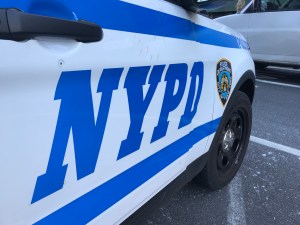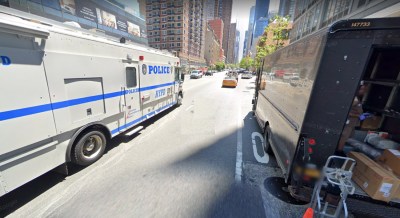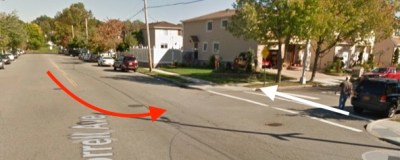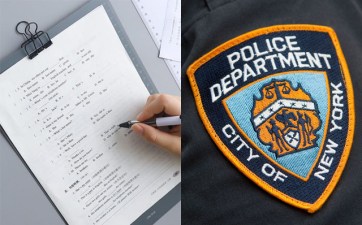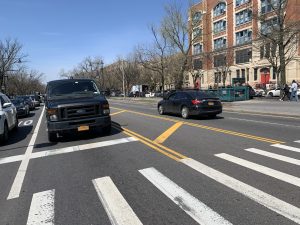Jack Koval’s Parents Had to Conduct Their Own Crash Investigation to Hold the Cop Who Struck and Killed Their Son Accountable
NYPD blamed Jack Koval for his own death, and the DA didn't charge the off-duty NYPD officer who killed him. But after hearing from a witness the Kovals tracked down on their own, a DMV judge found the driver at fault.
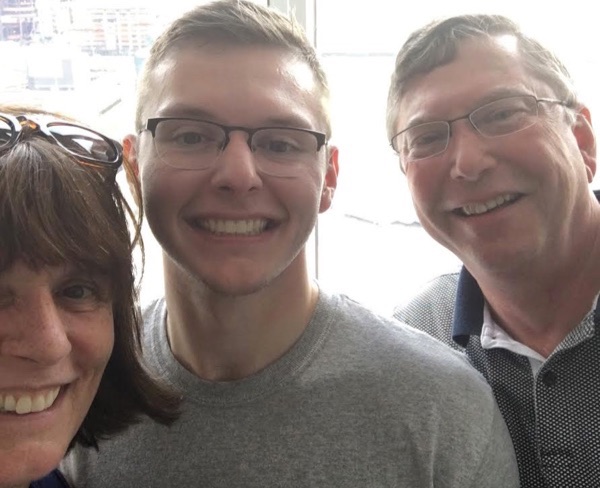
At 9:10 in the morning on August 1, 2016, Rochester resident Joe Koval got a voice mail from Jose Diaz, a police officer in New York City, where Joe’s 22-year-old son Jack Koval had moved weeks earlier for a new job, having graduated from Emory University in Atlanta that spring. When Joe called back two minutes later, Diaz told him Jack was dead.
At 2:17 a.m. the day before, Jack was crossing 12th Avenue at W. 45th Street in Manhattan, in a crosswalk, when he was struck by Steven Oquendo, an off-duty NYPD officer driving a Dodge Charger north on 12th. But by the time Diaz, the Collision Investigation Squad investigator assigned to the case, contacted Jack’s family some 31 hours later, a different story had emerged.
According to the preliminary NYPD report released to the media, Jack was hit when he “climbed over a divider and stepped into oncoming traffic.” Since then the Kovals have been working to clear their son’s name and see some measure of accountability applied to the driver who killed him.
While grieving the loss of their only child, the Kovals have been treated poorly by city employees and officials, who according to Jack’s mother Bobbi are often apathetic, or act as if they consider the family a nuisance.
In the hours and days after Jack’s death, there were problems getting the coroner’s office to release his body to a funeral home and on to Rochester, which the coroner’s staff blamed in part on the Kovals. NYPD lost track of personal items in Jack’s possession when he was struck. Bobbi says when Joe traveled from Rochester last September to retrieve Jack’s things, he was “misdirected around Manhattan” and ultimately went home empty-handed. Afterward, Diaz questioned whether Joe had actually gone where he was told.
“Above all there was a sense of low priority given to us by all New York public employees who indicated they would help us,” Bobbi told Streetsblog. “There was never a time that anyone returned our calls from one voice mail. It took frequent calls to get any response.” NYPD, meanwhile, has repeatedly discouraged the Kovals from talking to reporters.
The investigation of Jack’s death is a wellspring of anguish for his mother and father. The coroner told the Kovals Jack sustained a broken right leg, broken right pelvis, five broken ribs on the right side of his chest, and severe trauma to the right side of his head. He was rendered unconscious upon impact, the coroner said, and died of head and body trauma. These are signs of a high-speed collision, but Oquendo was not ticketed or charged by NYPD.
During their first conversation, Diaz told Joe the driver who hit Jack remained at the scene and was tested for impairment. It was more than a month later when the Kovals learned Oquendo was a police officer.
The initial police report provided to the Kovals had contact information for just two witnesses. “We said, Why are there only two?” says Bobbi. “They said, Standard operating procedure.” The Kovals were later told one of the witnesses’s phone numbers was not active, “so that left one witness, which the DA’s office felt was enough.”
Joe tried calling the reportedly missing witness himself. The witness answered the phone. He has since provided a statement to the Kovals’ attorney indicating traffic on 12th Avenue was stopped for a red light when Jack was crossing the street, and the light changed while he was still in the crosswalk.
Manhattan District Attorney Cy Vance declined to charge Oquendo with a crime. Bobbi and Joe met with Jill Hoexter, Vance’s vehicular crimes chief, last September. “Our goal was to keep the case of Jack Koval open to allow additional investigations to take place,” says Bobbi, “as we felt the answers we were given made no sense.”
With Jack’s parents and attorneys hired by the family in the room, Bobbi says Hoexter blamed Jack for his own death. According to Bobbi, Hoexter said Jack was intoxicated, and crossed against the light. “She looked me right in the eye and with a smirk on her face told me it was his fault,” Bobbi says. “I was shocked at how crass she was in the handling of a parent who had lost a child. It certainly shut me down that day, and shut me up, too.”
Vance spokesperson Joan Vollero disputed Bobbi’s account of the meeting. “Jill Hoexter has dedicated her entire career to helping victims of vehicular crime,” Vollero told Streetsblog via email. “She would never ‘smirk’ at or take joy in hurting a family, nor would she ever be ‘crass’ in her discussion of a case with a victim’s family. In fact, Jill is brought into these discussions for her empathy and experience handling these emotionally fraught interactions. She would never, ever say that it was the victim’s fault — and I trust her fully when she says that she did NOT state that in this meeting.”
Vance’s office closed the case in December, having determined there was no criminality on the part of Oquendo.
Said Vollero:
This case was overseen by no less than three prosecutors extensively trained in vehicular and homicide investigations, including the Chief of our Vehicular Crimes Unit. In this particular instance, the strike (and the events leading up to it) were clearly captured on surveillance video. Because the driver was stopped at a red light, behind other cars, and traveled approximately one car length before striking Mr. Koval, his speed could not be so excessive as to amount to a “gross deviation from the standard of care that a reasonable person would observe,” as required to sustain a charge of criminally negligent homicide. Additionally, no other factors of negligence or recklessness exist. The driver was not on his phone. He was not intoxicated or under the influence of drugs. He had a green light and was moving with traffic. He stayed at the scene. The evidence does not support a finding that he acted recklessly or negligently on July 31, 2016.
The Kovals have yet to see a Collision Investigation Squad report, which is NYPD’s final word on who is responsible for their son’s death. Last August, Diaz told Joe the investigation would take six to eight months. In April, the Kovals’ attorney filed a freedom of information request for the CIS report, so they would have it for Oquendo’s Department of Motor Vehicles hearing, where an administrative law judge would hear testimony before deciding whether to suspend or revoke his drivers license. To date, NYPD hasn’t produced the report for the Kovals. NYPD didn’t provide it to the DMV for the hearing, and didn’t send anyone to testify.
Based at least in part on evidence collected by the Kovals and their legal team, the DMV judge suspended Oquendo’s license for 90 days. In written testimony submitted at the hearing, Oklahoma resident Troy Lynn Mitchell, who witnessed the crash from a cab, said Oquendo was “operating too quickly and aggressively,” Gothamist reported. Mitchell said Oquendo was stopped behind an SUV, in the lane directly to the left of his cab, before the collision:
When the light turned green, the large SUV pulled away from the light. We accelerated a little slower. As a result, space was created between the large SUV and our vehicle. The Charger quickly continued to accelerate and suddenly changed lanes … The Charger continued to accelerate as he entered the intersection at a speed that seemed unsafe for roadway conditions. As he continued to accelerate I saw him strike a pedestrian who was in [crosswalk].
Oquendo’s account doesn’t match Mitchell’s. “The vehicle in front of me suddenly stopped and I didn’t have enough time to stop behind it, so I had to go to the right of it to avoid striking that vehicle,” Oquendo told the DMV judge. “That’s when the accident happened.”
The Kovals’ attorney Daniel Flanzig, who obtained Mitchell’s testimony, told Gothamist the family “would have been shit out of luck” without it.
The DMV ruling will help the civil case against Oquendo, and it takes a dangerous driver off the streets, if only for a few months. Maybe more important to the Kovals is that, like families of other crash victims who couldn’t speak for themselves, they saw their loved one vindicated in a public forum, despite a traffic justice system that still favors drivers who kill people.
Says Bobbi: “By finding the witness, [whom] the DA did not call, we were able to demonstrate to an impartial administrative law judge that Jack was the victim here.”
